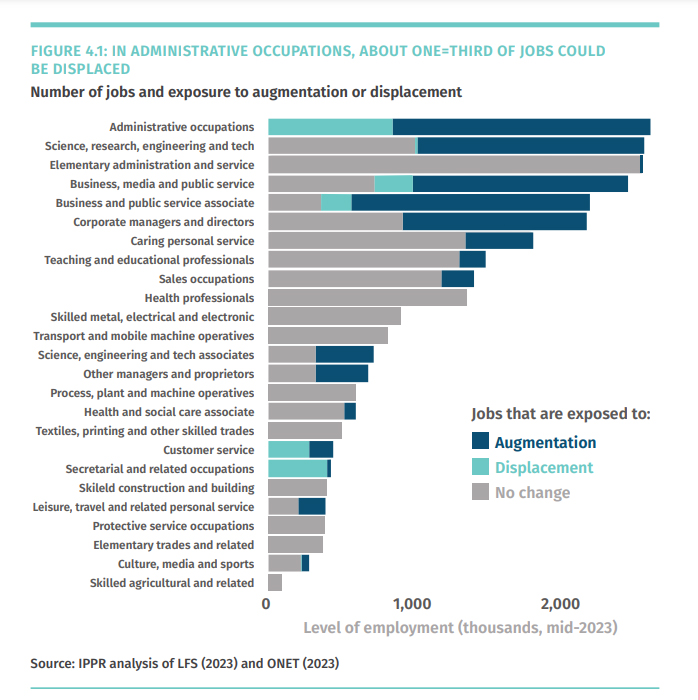
Generative AI can be economically disruptive through its impact on wage inequality, wealth inequality and potential job displacement. This IPPR report examines what policy’s role in the future of AI could be.
The world of knowledge work will be transformed by generative AI and we need to start preparing for this now, according to the report authors. They argue that we are at ‘a sliding doors’ moment when it comes to the impact of AI on the labour market, ‘with possibilities for huge job disruption in future or significant GDP gains, depending on government policy’.
The report modelled three scenarios, ‘best, worst and medium’, both for where we are now on AI, and where we might be in the future, depending on policy choices. On where we are now, for instance, a best scenario would mean no job losses and GDP gains of 4% while a worst-case scenario would mean 1.5m jobs lost and no GDP gain. The core message appears to be that ‘a job apocalypse’ is not inevitable, but coordinated action and careful steering from government and leading employers is needed.
First they take over the routine tasks
The report identifies two key stages of generative AI adoption: the first wave, which is here and now, and a second wave in which companies will integrate existing AI technologies further and more deeply into their processes.
11 per cent of tasks done by workers are already exposed to in the first wave. It identifies ‘routine cognitive’ tasks (such as database management) and ‘organisational and strategic’ tasks (such as scheduling or inventory management) as most exposed to generative AI, which can both read and create text, software code and data.
However, this could increase to AI doing 59 per cent of tasks in the second wave. This would also impact non-routine cognitive tasks (such as creating and maintaining databases) and would affect increasingly higher earning jobs.
Women and young people most at risk
It says that back-office, entry level and part time jobs are at the highest risk of being disrupted during the first wave. These include secretarial, customer service and administrative roles.
Women are more likely to be in such jobs, which means they will be among the most affected, the report says. Young people are also at high risk as firms hire fewer people for entry-level jobs and introduce AI technologies instead. In addition, those on medium and low wages are most exposed to being replaced by AI.
Deployment of AI could also free up labour to fill gaps related to unaddressed social needs. For instance, workers could be re-allocated to social care and mental health services which are currently under-resourced.
The modelling shows that there is no single predetermined path for how AI implementation will play out in the labour market. It also urges intervention to ensure that the economic gains are widely spread, rather than accruing to only a few.
Key Points:
- Generative AI will significantly transform knowledge work: A large portion of knowledge work tasks (potentially up to 59%) are susceptible to automation by generative AI.
- The impact can be positive or negative depending on policy: The report emphasizes that government intervention is crucial to steer the impact of AI towards positive outcomes like economic growth (up to 4% GDP gain) and avoid job losses (up to 1.5 million jobs lost in a worst-case scenario).
- First wave disrupts routine jobs: In the initial phase, AI will likely replace repetitive tasks (like data management) and some organizational roles (like scheduling). This could disproportionately affect entry-level, part-time workers, and women.
- Second wave hits higher-skilled jobs: As AI technology advances, it could automate even non-routine tasks and impact higher-paying jobs.
- AI can create new opportunities: The report acknowledges that AI could free up human labor for areas with unmet needs, like social care.
- Policy should address inequality: The report warns that economic benefits from AI risk concentrating in the hands of a few, and policies should ensure these benefits are more widely distributed.
Register for free
No Credit Card required
- Register for free
- Free TeachingTimes Report every month